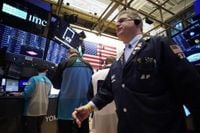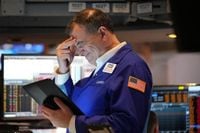U.S. stock futures plunged dramatically following President Donald Trump's announcement of sweeping tariffs on all trading partners, sending shockwaves through the markets and raising concerns about a potential trade war. The Dow Jones Industrial Average fell by 1,100 points, or 2.7%, on the evening of April 2, 2025, reflecting the immediate market reaction to the tariffs.
Futures attached to the Dow tumbled over 1,000 points, while the S&P 500 futures lost 3.9% and Nasdaq-100 futures sank by 4.7%. Major companies like Nike and Apple saw their shares drop 7%, while Amazon fell more than 5%, and Tesla was down 6% on the same day. The losses were even steeper for companies heavily reliant on imported goods, with Dollar Tree and Five Below experiencing declines of 11% and 15%, respectively.
During a press event at the White House, Trump declared April 2 as "Liberation Day," asserting that the new tariffs would free the U.S. from dependence on foreign goods. "My fellow Americans, this is Liberation Day," Trump proclaimed from the Rose Garden. "April 2, 2025, will forever be remembered as the day American industry was reborn, the day America's destiny was reclaimed, and the day that we began to make America wealthy again."
The president announced a minimum baseline tariff of 10% on all trading partners, alongside what he termed "kind reciprocal" tariffs on countries he identified as the worst offenders in trade relations with the U.S. Notably, China was set to face an additional 34% tariff, bringing its effective tariff rate to a staggering 54% when combined with a previous 20% tariff.
Experts have voiced concerns regarding the long-term implications of Trump's tariffs. Kara Reynolds, an economist at American University, warned that the new duties could threaten economic growth and employment. "If both businesses and consumers start to worry and pull back their spending, that is what can tip the U.S. over into a recession," she told ABC News. Mark Zandi, chief economist at Moody's Analytics, described the tariffs as "the fodder for an economic downturn."
As the tariffs are set to take effect on April 5, 2025, at 12:01 a.m. ET, with individualized tariffs beginning April 9, 2025, the uncertainty surrounding their impact has left investors on edge. With approximately 185 countries affected, analysts are grappling with the potential fallout. The market's reaction has been cautious, with many traders opting to stay on the sidelines as they await further clarity.
In the lead-up to Trump's announcement, stocks had shown some signs of recovery, but the mood quickly shifted as the president began speaking. The NASDAQ 100 initially attempted to rally but ultimately lost ground, reflecting the prevailing uncertainty in the market. Chris, a proprietary trader with two decades of experience, noted that traders were awaiting the tariffs' details, indicating that the announcement could lead to chaotic trading conditions.
Investors are particularly concerned about how the tariffs will affect specific sectors. Companies with significant exposure to China, such as Apple and Nvidia, are already feeling the heat, with stock prices tumbling amid fears of disrupted supply chains. Retailers like Walmart, Target, and Nike are also bracing for higher prices as a result of the tariffs.
As the market digests the implications of the tariffs, analysts are closely monitoring economic indicators. Recent data has shown signs of a weakening economy, with the ISM Manufacturing PMI falling to 49.0, below the expected 50.3. Additionally, the JOLTS Job Openings report indicated a decline, with job openings at 7.57 million, compared to the anticipated 7.69 million.
Concerns about stagflation are also rising, as inflation pressures mount alongside slowing growth. The Core PCE index, the Federal Reserve's preferred inflation gauge, rattled investors when it came in higher than expected. With the market's volatility expected to continue, attention will soon shift to the upcoming March non-farm payrolls report, scheduled for release on April 4, 2025.
In the wake of the tariff announcement, the dollar index has struggled, prompting a shift towards safe-haven assets like gold and the yen. Gold futures rose 0.58% as investors sought refuge from the uncertainty surrounding the tariffs. Meanwhile, crude oil prices have been affected by the prospect of tariffs on imports, which could lead to higher domestic gasoline and diesel prices.
As the markets brace for the full impact of Trump's tariffs, the situation remains fluid. The upcoming weeks will be critical in determining how these measures will shape economic conditions and market dynamics. With uncertainty looming, traders are advised to remain vigilant and prepared for potential volatility.








